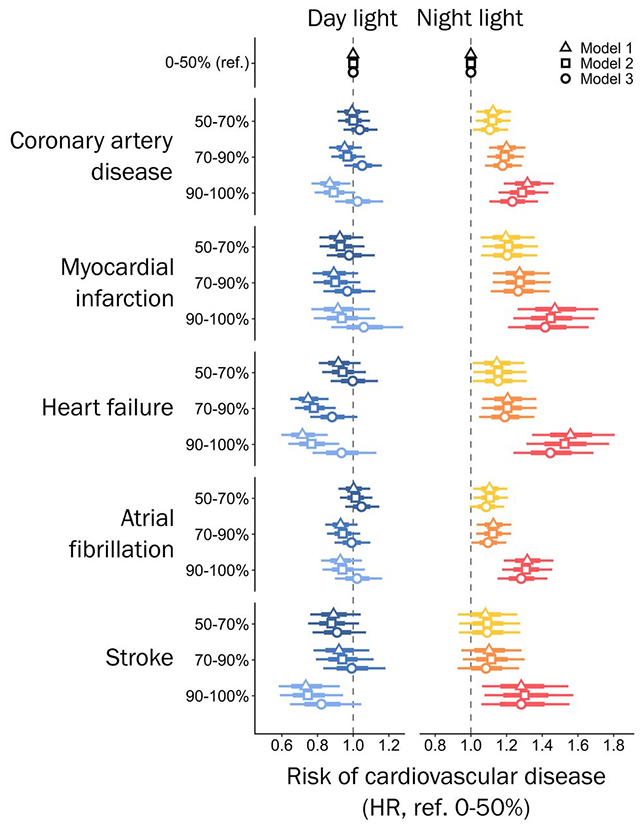It might be time to invest in some blackout curtains, turn off the TV before bed, and dim those lamps. New research suggests that exposure to light at night could elevate your risk of multiple heart issues.
The association makes biological sense. Our bodies use light signals to tell when it's time to sleep, and any disruption to that routine can interfere with our circadian rhythms, which regulate countless internal processes.
"Light at night causes circadian disruption, which is a known risk factor for adverse cardiovascular outcomes," writes the international team of scientists in a new study, which is yet to be peer-reviewed or published.
"However, it is not well understood whether personal light exposure patterns predict an individual's risk of cardiovascular diseases."
Related: Brighter Nights And Darker Days Can Have a Serious Effect on Mortality Risk
To investigate, the researchers analyzed data from 88,905 adults who wore wrist sensors to track light exposure over the course of a week, with follow-up health checks for the next 9.5 years. The volunteers were grouped based on how much light they were exposed to overnight.
Compared to the bottom half of the participants, the 10 percent exposed to the most light at night had a significantly higher risk of heart issues, including coronary artery disease, heart attack, heart failure, atrial fibrillation, and stroke.

The researchers accounted for factors that impact heart health, including smoking, alcohol consumption, diet, sleep duration, physical activity, socioeconomic status, and genetic risk, to try and better isolate the effect of light exposure at night.
The data from this type of study doesn't prove direct cause and effect – only that there's a strong association. It's enough to suggest light at night as a risk factor for heart health problems and that minimizing it could be a simple and effective way of reducing risk.
"Relationships of night light with risk of heart failure and coronary artery disease were stronger for women, and relationships of night light with risk of heart failure and atrial fibrillation were stronger for younger individuals in this cohort," write the researchers.
The researchers point to the many functions of our bodies that rely on regular, well-defined circadian rhythms – everything from blood pressure to glucose tolerance. Disrupting those rhythms, with night shifts for example, can impact our health.

One of the mechanisms at play could be hypercoagulability – an increased tendency for blood to clot, which has previously been linked to disruptions in circadian rhythms. However, there are likely to be numerous reasons for these associations.
The researchers hope to see future studies collecting nighttime light data over a longer period of time, and with extra information about the sources of light, which should help improve our understanding of this relationship.
Most of us will now have at least one glowing screen inside our bedrooms, and this gives us another reason to turn those screens off: a survey suggests more than half of the US population actually falls asleep with the TV on.
"Avoiding light at night may be a useful strategy for reducing risks of cardiovascular diseases," write the researchers.
The research has yet to be published in a peer-reviewed journal, but a preprint is available on MedRxiv.
